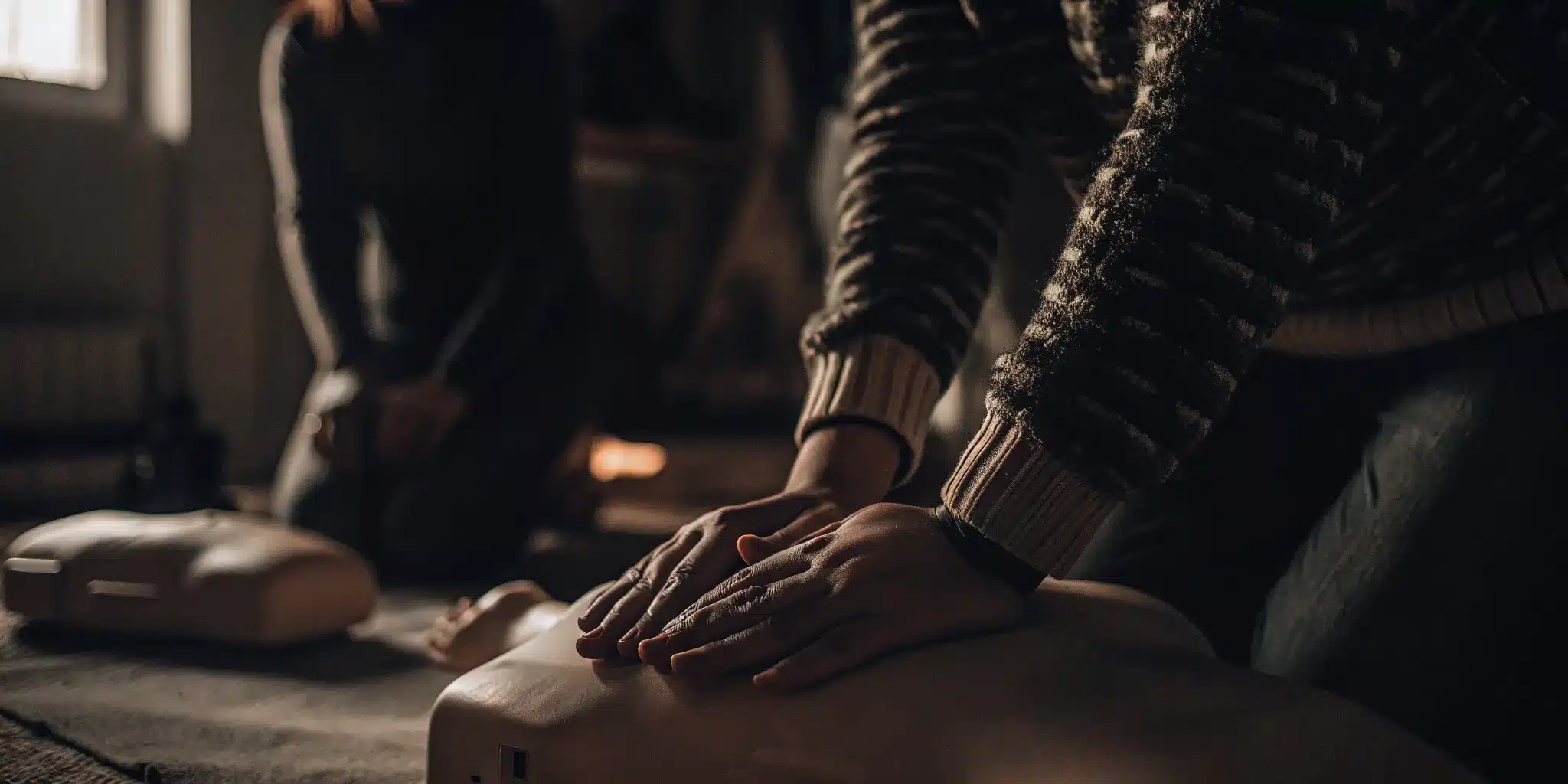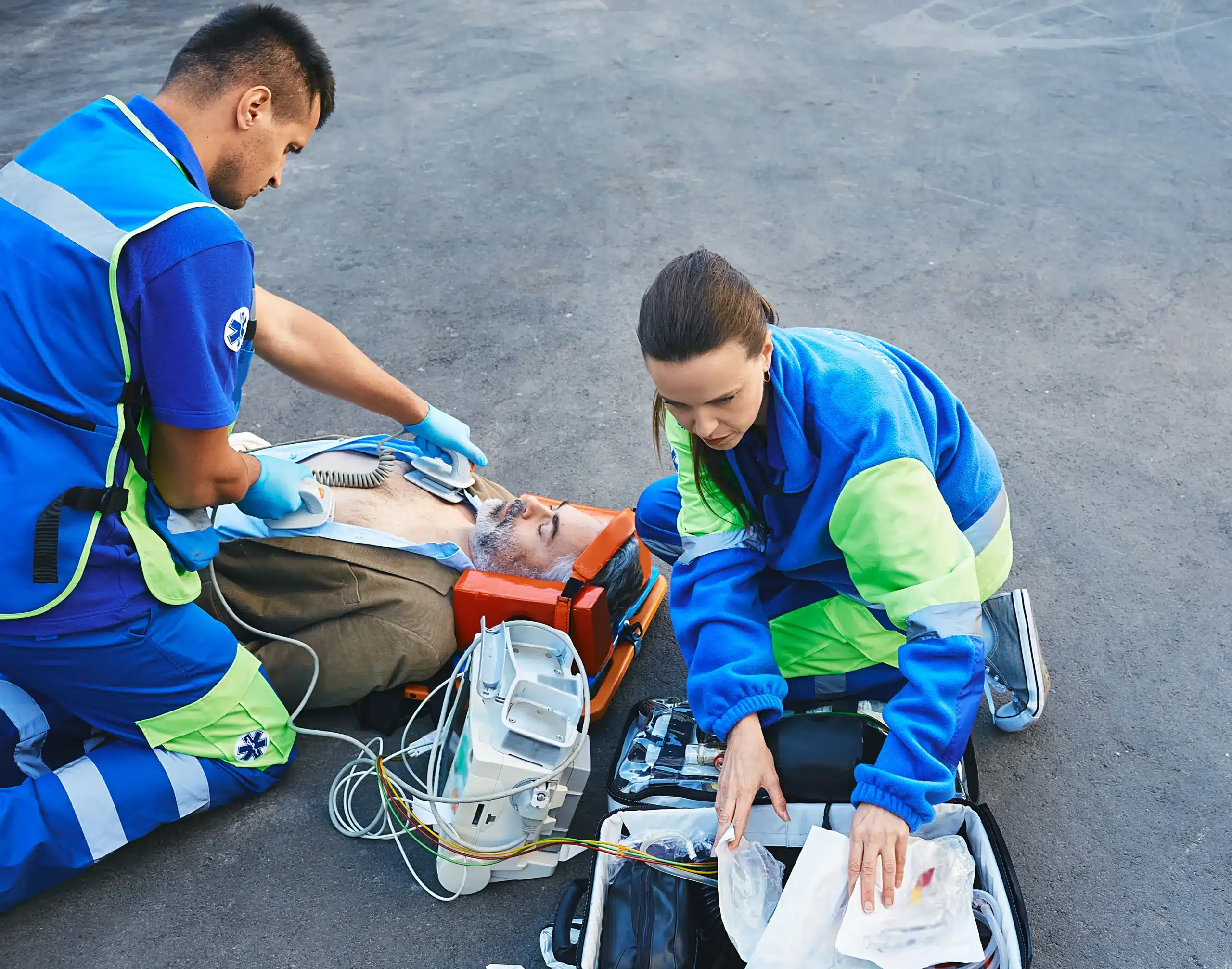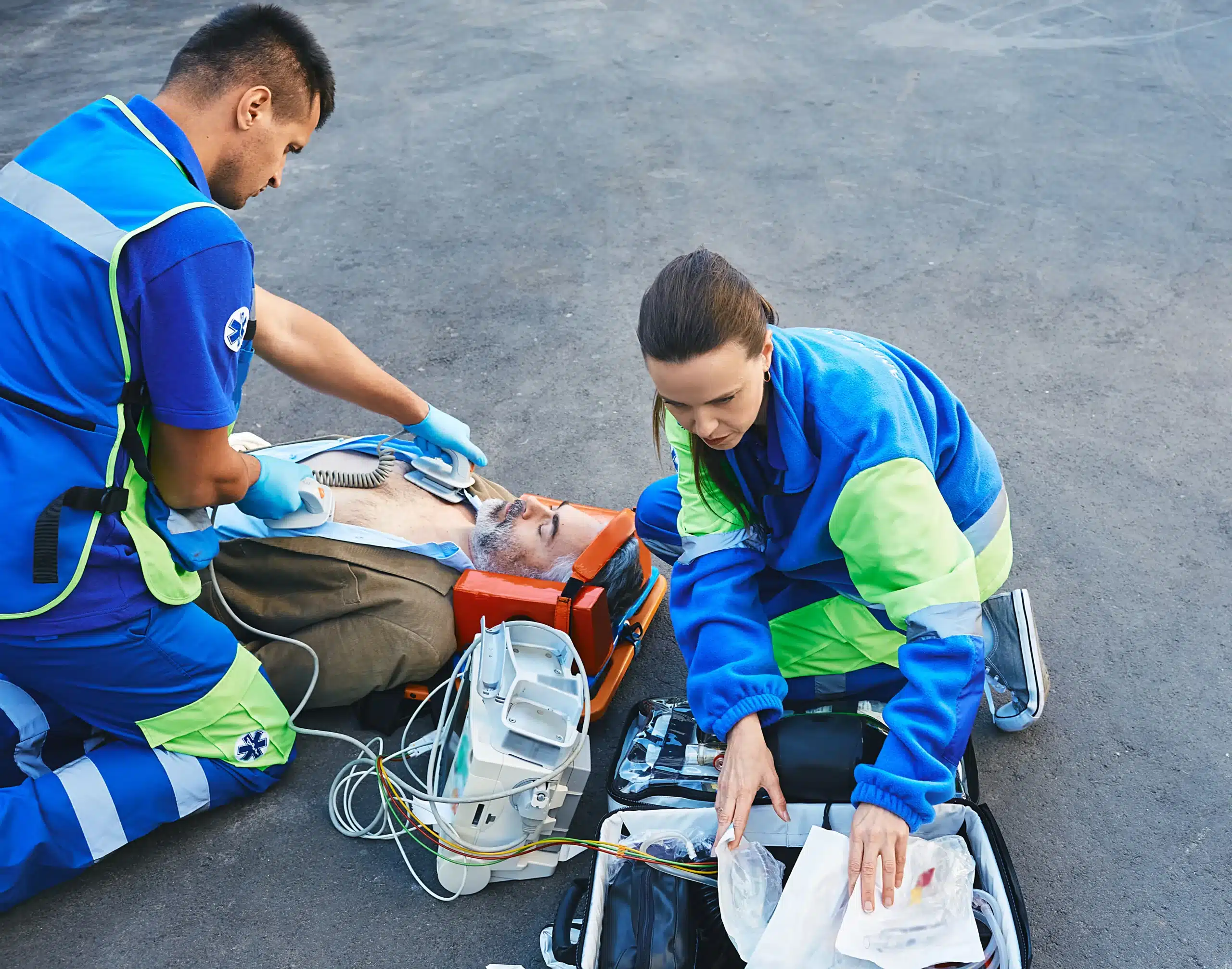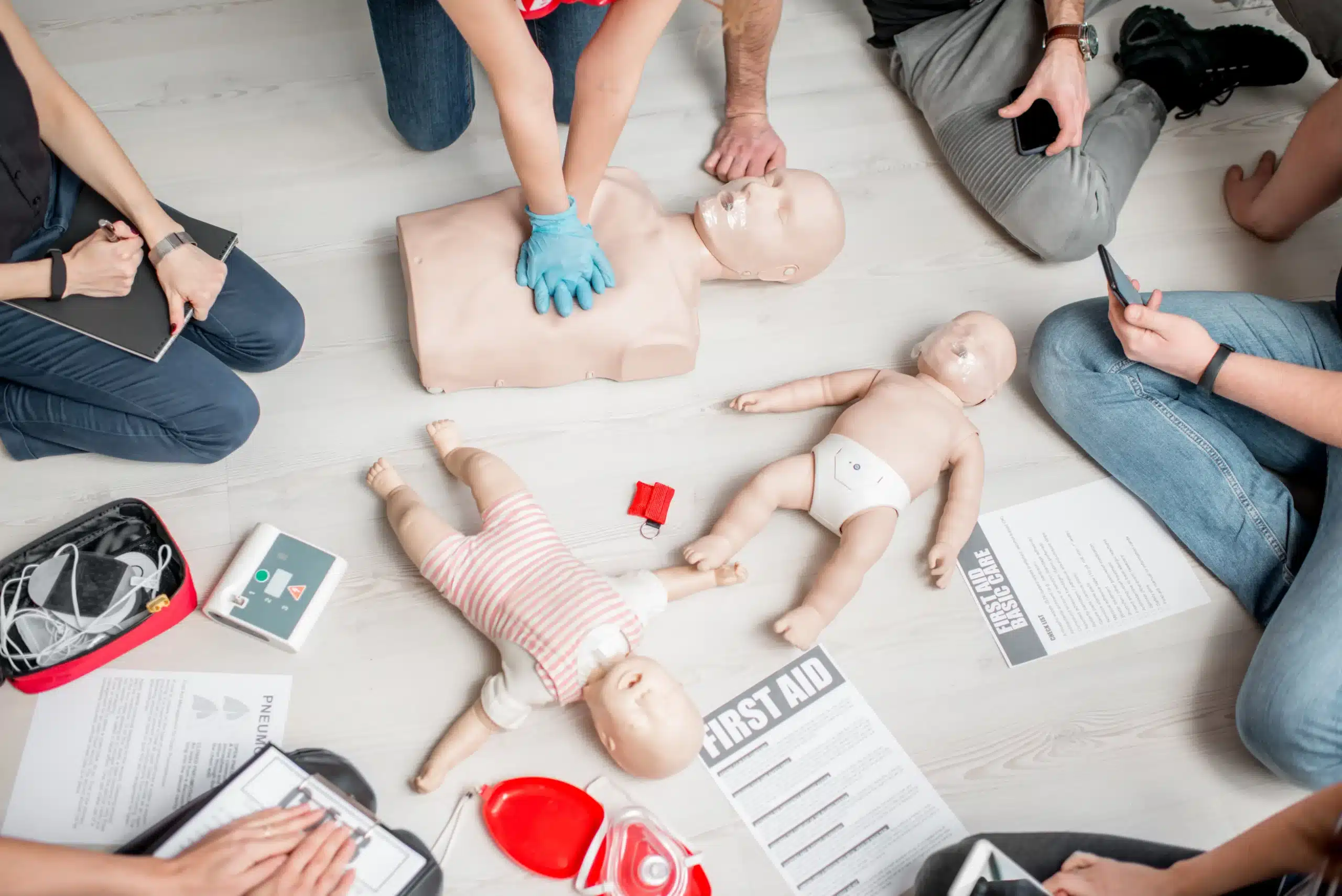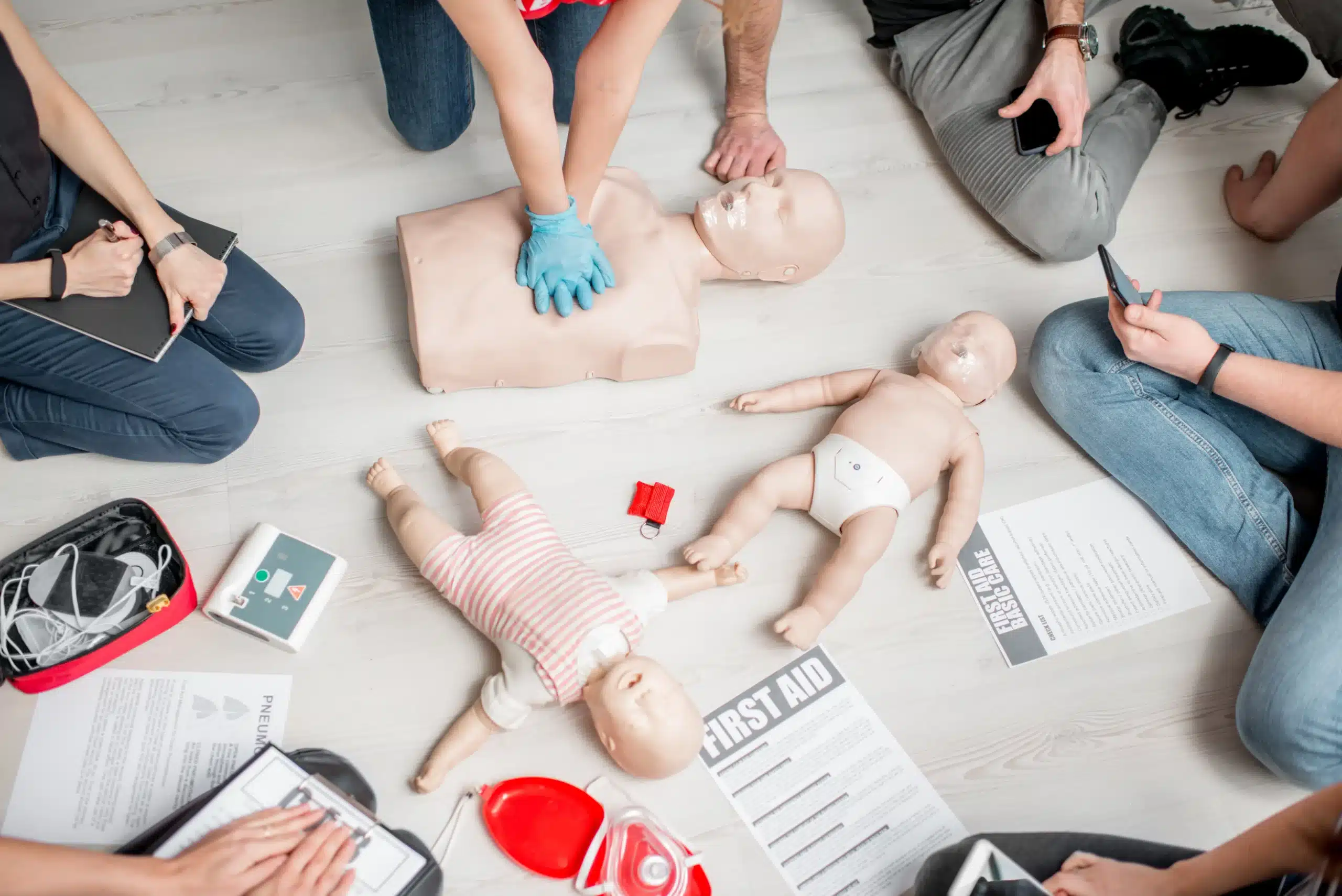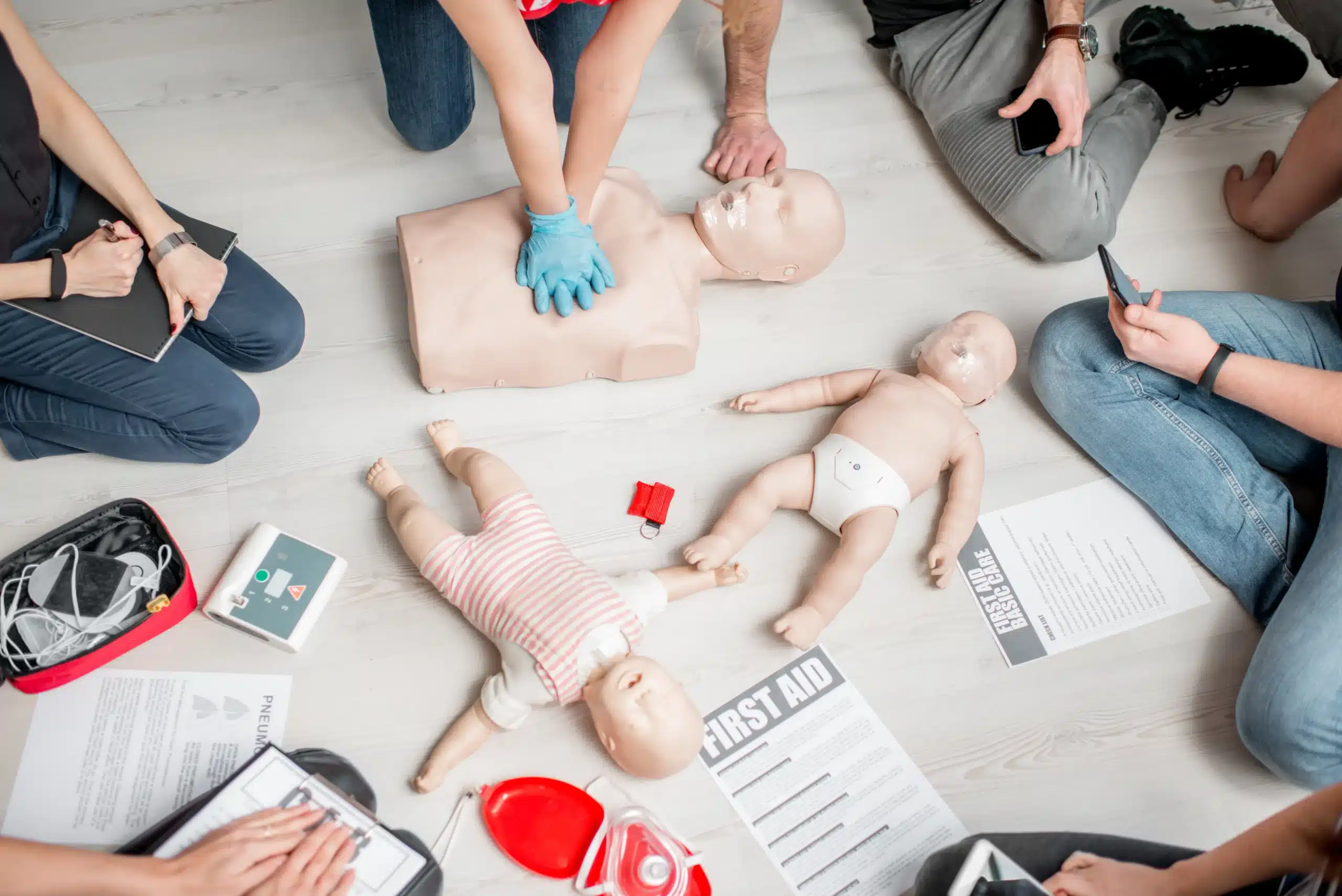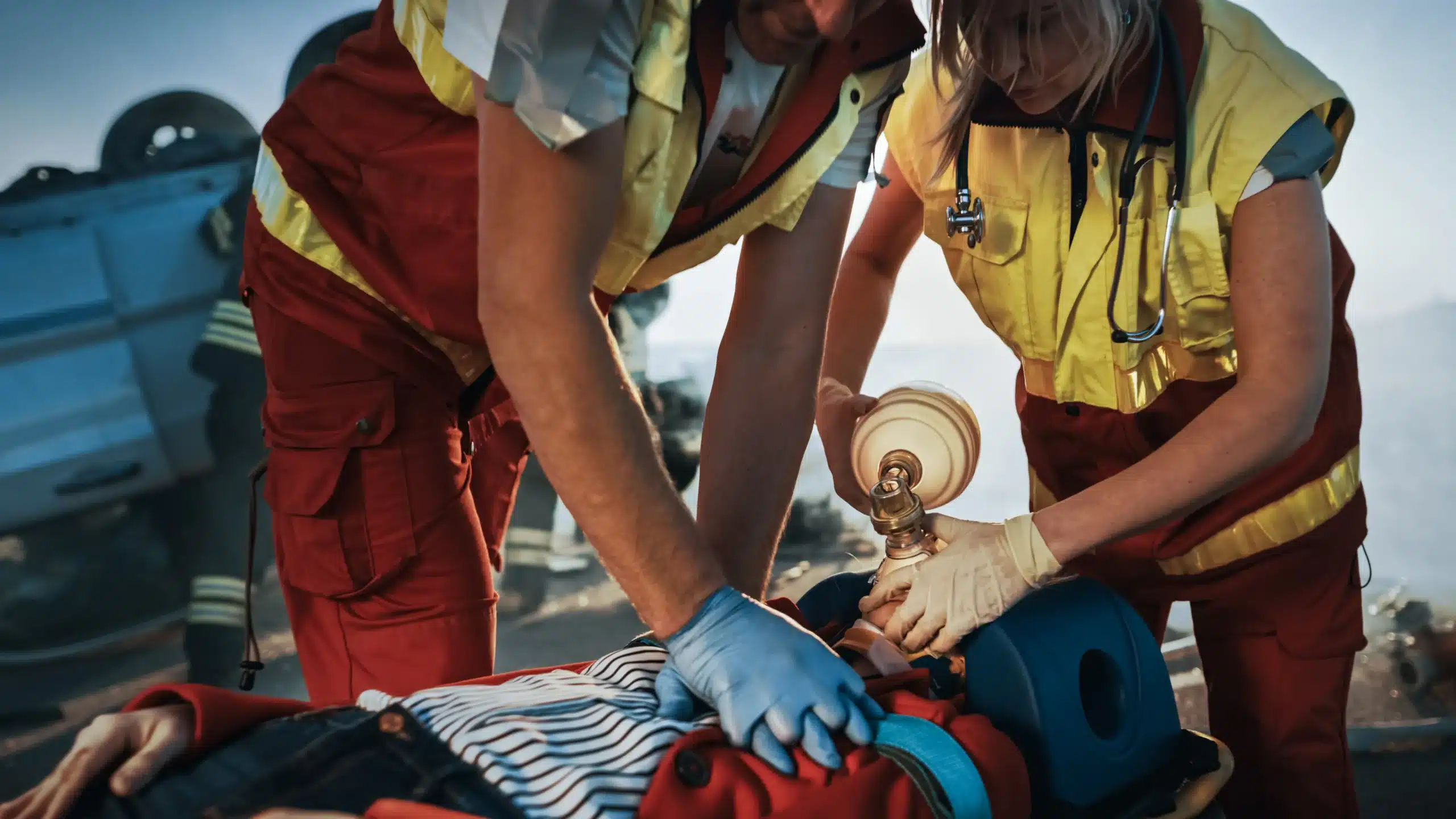Emergencies can happen anytime, anywhere. Are you ready to respond? CPR training Walnut Creek provides you with the life-saving skills to handle medical crises effectively. This guide is your one-stop resource for all things CPR training in Walnut Creek, Concord, and Pleasant Hill. We’ll cover the different levels of certification, the importance of choosing the right provider, and the benefits of CPR training for various professions. We’ll also address common concerns and misconceptions about CPR, empowering you to take the first step towards becoming a more prepared and confident member of your community.
Key Takeaways
- CPR training equips you with essential life-saving skills: Whether you’re a healthcare professional, childcare provider, or simply want to be prepared, CPR training provides the knowledge and confidence to respond effectively in emergencies. Explore various levels of training to find the right fit.
- Select a CPR training provider carefully: Prioritize certified instructors, comprehensive course content, and a positive learning environment. Consider class size, format (in-person or online), and what’s included in the course fee to make an informed choice.
- Safety Training Seminars offers convenient and affordable training in Walnut Creek: With a low price guarantee, flexible scheduling, and experienced instructors, Safety Training Seminars makes high-quality CPR training accessible to everyone. Explore their course offerings and find a class that works for you.
What is CPR Training?
CPR training equips you with the life-saving skills to respond to cardiac arrest and other medical emergencies. Different levels of CPR training cater to various needs, from basic life support for the general public to advanced techniques for healthcare professionals. Let’s explore the key types of CPR training offered in Walnut Creek:
BLS
BLS (Basic Life Support) provides the foundational knowledge and skills to perform CPR on adults, children, and infants. You’ll learn how to recognize the signs of cardiac arrest, provide high-quality chest compressions, deliver rescue breaths, and use an AED (automated external defibrillator). BLS certification is often a prerequisite for other healthcare certifications and is valuable for anyone wanting to be prepared for emergencies. It’s a smart choice for those in healthcare, education, or childcare, as well as anyone in Walnut Creek, Concord, and Pleasant Hill who wants to learn these essential skills.
ACLS
ACLS (Advanced Cardiovascular Life Support) training builds upon the fundamentals of BLS, focusing on the advanced management of cardiovascular emergencies. This course covers a broader range of interventions, including airway management, rhythm recognition, and pharmacological therapies. ACLS certification is typically required for healthcare professionals working in critical care settings, such as physicians, nurses, and paramedics. Safety Training Seminars offers ACLS training in Walnut Creek, making it easily accessible for local healthcare providers.
PALS
PALS (Pediatric Advanced Life Support) is specifically designed for healthcare providers who care for infants and children. This specialized training emphasizes the unique physiological differences between children and adults, providing the skills to effectively manage pediatric emergencies. PALS covers topics such as respiratory distress, shock, and cardiac arrest in infants and children. Like ACLS, PALS certification is essential for healthcare professionals working in pediatric critical care. Check out Safety Training Seminars for PALS courses in Walnut Creek.
First Aid/CPR Combo Courses
Combining first aid and CPR training provides a well-rounded approach to emergency preparedness. These courses teach you how to respond to a wide range of medical situations, from minor injuries like cuts and burns to life-threatening conditions like cardiac arrest. A combined course is an excellent option for anyone looking to gain comprehensive skills and confidence in handling various emergencies. It’s particularly relevant for those working with children, such as teachers and childcare providers in the Walnut Creek area, who may encounter both minor injuries and more serious medical events. Safety Training Seminars offers these combined courses locally, making it convenient to get comprehensive training.
Choosing a CPR Training Provider
Finding the right CPR training provider is crucial for a valuable learning experience. Consider these key factors when making your decision:
Instructor Qualifications
Look for training centers with certified instructors, ideally affiliated with recognized organizations like the American Heart Association. Experienced instructors bring real-world knowledge and best practices to the classroom, creating a richer learning environment. Check if the instructors are healthcare providers or have extensive backgrounds in emergency response. Their expertise will ensure you receive high-quality training that meets industry standards. A good instructor can make all the difference in your confidence and skill level.
Course Content
A comprehensive CPR course should cover essential techniques for adults, children, and infants, including how to recognize the signs of a cardiac arrest and how to respond effectively. The course should also include training on using an automated external defibrillator (AED) and how to handle choking emergencies. Ask about the curriculum and ensure it aligns with the latest guidelines from organizations like the American Heart Association. Regularly updated course content is essential to reflect advancements in CPR techniques.
Class Size & Environment
A smaller class size allows for more personalized attention from the instructor and creates a comfortable space for asking questions. Consider the classroom setting, too. Is it conducive to hands-on learning? Does it offer ample space to practice techniques on mannequins? A positive and supportive learning environment can significantly impact your ability to absorb information and develop the necessary skills. Look for providers who prioritize student feedback and strive to improve their training programs.
In-Person vs. Online
Both in-person and online CPR training have their advantages. In-person classes provide hands-on practice and direct interaction with instructors and peers. This can be especially beneficial for kinesthetic learners who thrive in a practical setting. Online courses offer flexibility and convenience, allowing you to learn at your own pace and from anywhere with an internet connection. Consider your learning style and schedule when deciding which format is best for you. Research the cost of CPR training to compare pricing and what’s included in different formats.
CPR Training Costs & Inclusions
Knowing the price range and what’s included in CPR training can help you budget and choose the right course. Let’s break down the typical costs and what you can expect.
Course Pricing
CPR certification costs vary depending on the course type and provider. Basic CPR classes typically range from $50 to $150. More advanced certifications, such as ACLS or PALS, or combination courses that include first aid, might cost $200 or more. These prices usually cover training materials, instructor fees, and the certification exam. Check with specific providers like Safety Training Seminars for their exact pricing on their website.
Included Items
Most CPR training courses bundle essential items into the overall cost. This typically covers your training materials, instructor fees, and the cost of the certification exam. Some courses may also provide additional resources, like online practice tests or refresher materials. Be sure to ask your chosen provider what’s included in their course fee.
Discounts
Many CPR training providers offer discounts, especially for group bookings. If you’re training with a group, inquire about group discounts. Some providers offer reduced rates for groups of five or more students. Safety Training Seminars also has a low price guarantee, so you can feel confident you’re getting a competitive rate.
Certification Process & Validity
Getting CPR certified is straightforward, and maintaining that certification is key to keeping your skills sharp. Here’s what’s involved:
Get Certified
To become CPR certified, you must complete an accredited training course, like those offered at Safety Training Seminars. These courses cover essential life-saving techniques and prepare you for real-world emergencies. Our classes combine hands-on practice and instruction, culminating in a certification exam. After successfully completing the exam, you’ll receive an official American Heart Association (AHA) certification card, valid for two years. This nationally recognized certification validates your CPR competence and is often required for many healthcare and childcare professions.
Certification Duration
CPR certification is typically valid for two years. The cost of CPR training varies depending on the training level and provider but generally ranges from $50 to $150 for basic courses. More advanced certifications, such as ACLS or PALS, or those including comprehensive first aid, may cost more. This investment equips you with invaluable skills and fulfills requirements for many workplaces and professional organizations. Safety Training Seminars offers a low price guarantee to ensure you receive high-quality, affordable training.
Renewing Certification
Staying current with your CPR skills is crucial for effective emergency response. Like many life support certifications, CPR certification requires renewal every two years. This refresher training ensures you’re up-to-date on the latest CPR guidelines and techniques, which can significantly impact outcomes in critical situations. Consider our convenient RQI program for an easy and efficient way to maintain your certification.
CPR Training Benefits by Profession
CPR training offers distinct advantages across various professions. Whether you’re a healthcare provider, work with children, or simply want to be prepared for an emergency, understanding these benefits can highlight the value of CPR certification.
Healthcare
CPR training is fundamental for healthcare professionals. Doctors, nurses, and paramedics regularly face situations requiring immediate intervention. Solid CPR skills empower these professionals to respond effectively to cardiac arrest and respiratory emergencies, directly impacting patient outcomes and potentially saving lives. For more information on healthcare provider CPR training, check out this resource on CPR Training.
Childcare
In childcare settings, CPR certification is often a job requirement, and with good reason. Teachers, daycare workers, and anyone caring for children benefit immensely from CPR training. It equips them to handle emergencies involving infants and children, creating a safer environment. To learn more about CPR certification for childcare providers, review these FAQs on online CPR Certifications.
Fitness
Fitness professionals, such as personal trainers and group instructors, are also encouraged to become CPR certified. Given the physical nature of their work, emergencies like cardiac events can occur during training sessions. CPR training enables fitness professionals to respond swiftly and confidently, ensuring client safety. This CPR & AED Online Training resource offers further insights.
General Public/Workplace
CPR training isn’t limited to specific professions; it’s a valuable skill for everyone. Employees across various sectors, from security and hospitality to office settings, can contribute to a safer workplace by learning CPR. This training fosters a culture of preparedness and empowers individuals to respond effectively in emergencies, potentially improving outcomes until professional medical help arrives. Explore the benefits of workplace safety training to see how CPR contributes to a safer work environment.
Top Walnut Creek CPR Providers
Finding the right CPR training provider is crucial for a positive and effective learning experience. Here are a few reputable options in Walnut Creek:
Safety Training Seminars
Safety Training Seminars is a woman-owned American Heart Association (AHA) Training Center dedicated to high-quality CPR and first-aid instruction. They offer a comprehensive range of certifications, including BLS, ACLS, PALS, CPR, and First Aid. With classes conveniently scheduled seven days a week throughout Walnut Creek and surrounding areas like Concord and Pleasant Hill, finding a time that works for you is easy. They also offer the RQI program for convenient skills verification and have a low price guarantee. Learn more about their class schedules and pricing.
CPR Education
CPR Education focuses on providing CPR classes and training programs in Walnut Creek and nearby cities. Their instructors are experienced professionals, including firefighters, EMTs, and paramedics, all certified by the American Heart Association. This ensures participants learn from individuals with real-world experience. Explore their website for more information on their courses.
Walnut Creek CPR Training Center
With 28 years as an authorized American Heart Association training center, Walnut Creek CPR Training Center offers a wide selection of CPR and advanced life support courses. They provide training in ACLS, PALS, BLS, and NRP, serving both healthcare professionals and the general public. Their long-standing presence in the community makes them a reliable choice for developing or refreshing your lifesaving skills.
Prepare for Your CPR Course
Getting ready for your CPR class shouldn’t be stressful. Knowing what to expect, what to bring, and how to prepare beforehand can make your learning experience smoother and more effective. Here’s a guide to help you get ready for your CPR training in Walnut Creek:
What to Expect
At Safety Training Seminars, we offer CPR classes daily, so you can easily find a time that works with your schedule. Our courses are comprehensive and designed to equip you with the skills you need to respond confidently in an emergency. We pride ourselves on excellent customer service—our representatives are available every day to answer questions and help with scheduling. You can expect your Basic Life Support (BLS) CPR class to last between four and six hours, depending on the specific course format.
What to Bring
We provide all the necessary training materials, but there are a few things you might want to bring for your comfort. A notebook and pen can be helpful for taking notes, and a water bottle will keep you hydrated. Comfortable clothing is also recommended, as you’ll be practicing skills that involve movement. You’ll receive your official American Heart Association (AHA) certification card upon successful completion of the course, valid for two years. Our instructors are AHA-certified and experienced emergency personnel, including firefighters, EMTs, and paramedics, ensuring you receive high-quality training.
Pre-Course Study
While pre-course studying isn’t required, familiarizing yourself with basic first aid principles can be helpful. Consider the course duration and the level of certification offered when choosing a class. Think about your training goals and budget. The cost of CPR certification typically covers training materials, instructor fees, and the certification exam. We offer a low-price guarantee, so you can be confident you’re getting quality training at an affordable price.
Common CPR Training Concerns
It’s normal to have a few questions or hesitations before signing up for a CPR class. Let’s address some common concerns:
CPR Myths
One of the biggest roadblocks is the idea that CPR is only for medical professionals. This simply isn’t true. Anyone can learn CPR—in fact, bystanders are often the first on the scene in an emergency. Learning CPR empowers you to potentially save a life before professional help arrives. Check out our blog post debunking common CPR myths.
Legal Aspects
Some people worry about legal ramifications if they perform CPR incorrectly. Good Samaritan laws exist to protect those who offer help in emergencies. These laws encourage people to act without fear of being sued, knowing they are protected if they act in good faith. For more information, read our article on CPR myths and legal protection.
Equipment-Free CPR
Another misconception is that you need special equipment to perform CPR. While some tools can be helpful, basic CPR can be performed effectively without any equipment at all. Your hands and knowledge are the most important tools in those critical first few minutes.
Class Accessibility
Finding the time for a CPR class can be a challenge. Safety Training Seminars offers classes in Walnut Creek seven days a week, making it easier to fit training into your schedule. We serve Walnut Creek, Concord, and Pleasant Hill, CA. This accessibility means more people in our community can gain these life-saving skills.
Why Choose Safety Training Seminars?
Finding the right CPR training can feel overwhelming, but Safety Training Seminars makes it easy. We prioritize quality instruction, flexible scheduling, and affordability, so you can confidently choose a course that fits your needs.
AHA Certification
As a woman-owned American Heart Association (AHA) Training Center, Safety Training Seminars delivers top-tier instruction. Our BLS, ACLS, PALS, CPR, and First-aid courses in Walnut Creek adhere to the AHA’s rigorous standards, giving you a certification recognized and respected by healthcare providers and employers. This commitment to quality ensures you receive the most up-to-date and comprehensive training available.
RQI Certification
For healthcare professionals seeking BLS, ACLS, and PALS certification, our RQI program offers a streamlined and efficient path. This innovative program emphasizes hands-on skills and provides immediate feedback, ensuring you’re fully prepared to respond to real-world emergencies.
Low Price Guarantee
We believe that cost shouldn’t be a barrier to life-saving skills. Safety Training Seminars offers a low price guarantee for our courses in Contra Costa County. We’re committed to providing affordable, high-quality training accessible to everyone in our community. Serving Walnut Creek, Concord, and Pleasant Hill, we make it convenient to find a class near you.
Flexible Classes
We understand you have a busy life. That’s why we offer classes daily, giving you the flexibility to choose a time that works best for your schedule. Whether you’re a healthcare professional, a childcare provider, or simply looking to learn CPR, you can find a class time that fits seamlessly into your routine.
Expert Instructors
Your learning experience is enhanced by our team of expert instructors. These certified AHA professionals bring real-world experience as firefighters, EMTs, and paramedics, providing you with practical insights and valuable knowledge that goes beyond the textbook. You’ll learn from seasoned professionals who understand the demands and nuances of emergency situations. Our instructors provide personalized attention and support, ensuring you gain the confidence and skills to act quickly and effectively in an emergency.
Related Articles
- Why Workplace CPR and First-Aid Training Is Crucial
- AHA ACLS Classes in Walnut Creek, CA – Walnut Creek CPR Classes
- AHA PALS Classes in Walnut Creek, CA – Walnut Creek CPR Classes
- CPR & First-aid Classes in Walnut Creek, CA – Walnut Creek CPR Classes
- Debunking Common CPR Myths for Better Emergency Response
Frequently Asked Questions
What’s the difference between BLS and ACLS? BLS is the foundation for CPR and focuses on immediate life support for all ages. ACLS builds upon BLS, adding advanced techniques for healthcare providers in critical care settings. Think of BLS as the essential first steps, while ACLS provides more specialized interventions.
How long does CPR certification last, and how do I renew it? CPR certification is typically valid for two years. Renewal involves completing a refresher course to stay updated on the latest guidelines and techniques. Check with your certifying organization or training provider for specific renewal requirements. Safety Training Seminars offers a convenient RQI program to help you maintain your certification.
What if I’m nervous about performing CPR in a real emergency? It’s completely normal to feel apprehensive. CPR training builds confidence by equipping you with the knowledge and skills to respond effectively. Remember, Good Samaritan laws offer legal protection for those who provide assistance in good faith during emergencies. Focus on the fact that your actions, even if imperfect, can significantly improve someone’s chances of survival.
Do I need to be a healthcare professional to take a CPR class? Absolutely not! CPR training is beneficial for everyone, regardless of profession. While certain certifications like ACLS and PALS are geared towards healthcare providers, basic CPR and first aid courses are open to anyone who wants to learn these life-saving skills. You could be a teacher, a parent, a student, or anyone who wants to be prepared for an emergency.
How can I find a reputable CPR training provider in my area? Look for providers affiliated with recognized organizations like the American Heart Association. Check instructor qualifications, course content, class size, and the overall learning environment. Read reviews and ask for recommendations. Consider factors like scheduling flexibility, cost, and what’s included in the course fee. A good training provider will be transparent about their offerings and happy to answer your questions.
This article was written for free by MEGA SEO.
